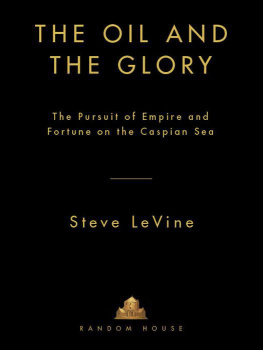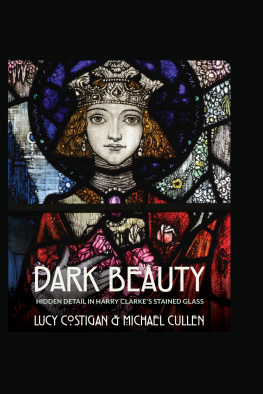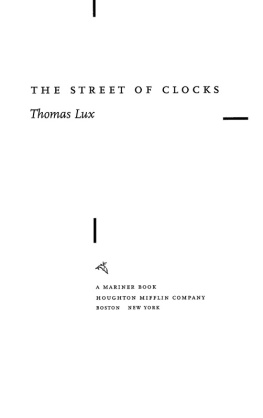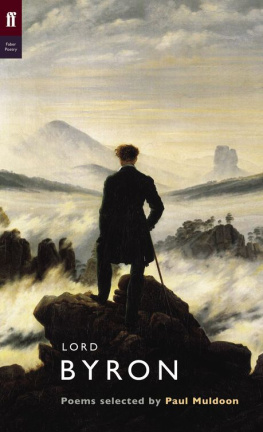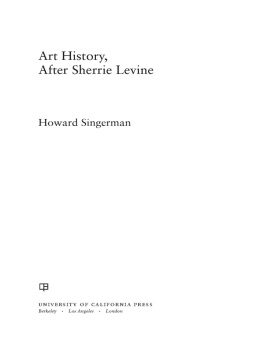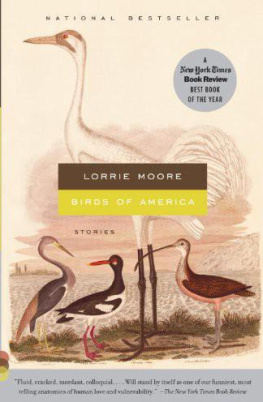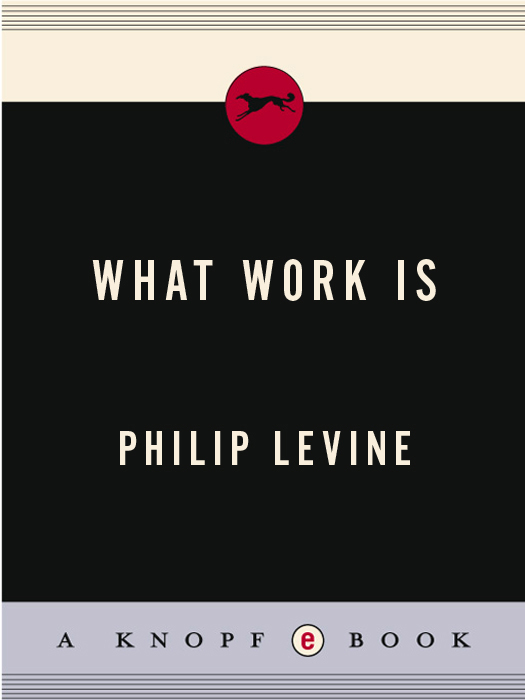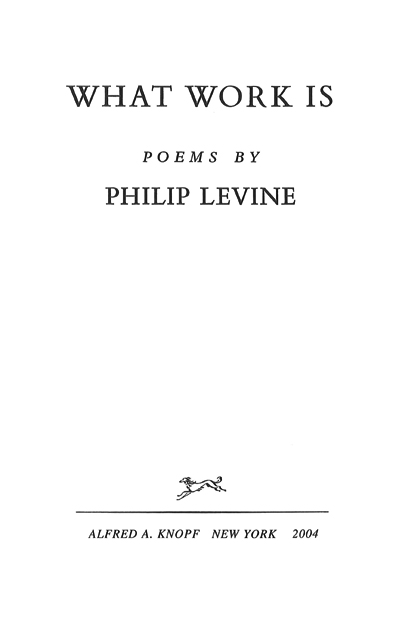THIS IS A BORZOI BOOK
PUBLISHED BY ALFRED A. KNOPF, INC . Copyright 1991 by Philip Levine All rights reserved under International and Pan-American Copyright Conventions. Published in the United States by Alfred A. Knopf, Inc., New York, and simultaneously in Canada by Random House of Canada Limited, Toronto. www.randomhouse.com/knopf/poetry/ My thanks to the editors of the following publications in which these poems first appeared:
Antaeus (Soloing)
The Atlantic Monthly (Among Children)
The Georgia Review (Coming Homeward from the Post Office)
The Gettysburg Review (The Seventh Summer)
Michigan Quarterly Review (My Grave)
The New England Review (The Sweetness of Bobby Hefka, Facts, & Coming of Age in Michigan)
The New Yorker (Fear and Fame, Coming Close, Fire, Every Blessed Day, What Work Is, Snails, Perennials, Above the World, M. www.randomhouse.com/knopf/poetry/ My thanks to the editors of the following publications in which these poems first appeared:
Antaeus (Soloing)
The Atlantic Monthly (Among Children)
The Georgia Review (Coming Homeward from the Post Office)
The Gettysburg Review (The Seventh Summer)
Michigan Quarterly Review (My Grave)
The New England Review (The Sweetness of Bobby Hefka, Facts, & Coming of Age in Michigan)
The New Yorker (Fear and Fame, Coming Close, Fire, Every Blessed Day, What Work Is, Snails, Perennials, Above the World, M.
Degas Teaches Art & Science at Durfee Intermediate School, and On the River) Poetry (Burned and The Right Cross) Western Humanities Review (Growth and Scouting) Zyzzyva (Gin) My special thanks to my friends who helped me with these poems and encouraged me to complete them, especially to Larry Levis, Garrett Hongo, Edward Hirsch, Donald Hall, Sharon Olds, and C.K. Williams. Library of Congress Cataloging-in-Publication Data
Levine, Philip, 1928
What work is : poems / Philip Levine.
p. cm.
eISBN: 978-0-307-76195-8
I. Title.
PS3562.E9W47 1991
811.54dc20 9053421 Reprinted Twelve Times v3.1 FOR LARRY LEVIS
CONTENTS
I
FEAR AND FAME
Half an hour to dress, wide rubber hip boots, gauntlets to the elbow, a plastic helmet like a knights but with a little glass window that kept steaming over, and a respirator to save my smoke-stained lungs. I would descend step by slow step into the dim world of the pickling tank and there prepare the new solutions from the great carboys of acids lowered to me on ropesall from a recipe I shared with nobody and learned from Frank OMera before he went off to the bars on Vernor Highway to drink himself to death.
A gallon of hydrochloric steaming from the wide glass mouth, a dash of pale nitric to bubble up, sulphuric to calm, metals for sweeteners, cleansers for salts, until I knew the burning stew was done. Then to climb back, step by stately step, the adventurer returned to the ordinary blinking lights of the swingshift at Feinberg and Breslins First-Rate Plumbing and Plating with a message from the kingdom of fire. Oddly enough no one welcomed me back, and Id stand fully armored as the downpour of cold water rained down on me and the smoking traces puddled at my feet like so much milk and melting snow. Then to disrobe down to my work pants and shirt, my black street shoes and white cotton socks, to reassume my nickname, strap on my Bulova, screw back my wedding ring, and with tap water gargle away the bitterness as best I could. For fifteen minutes or more Id sit quietly off to the side of the world as the women polished the tubes and fixtures to a burnished purity hung like Christmas ornaments on the racks pulled steadily toward the tanks Id cooked. Ahead lay the second cigarette, held in a shaking hand, as I took into myself the sickening heat to quell heat, a lunch of two Genoa salami sandwiches and Swiss cheese on heavy peasant bread baked by my Aunt Tsipie, and a third cigarette to kill the taste of the others.
Then to arise and dress again in the costume of my trade for the second time that night, stiffened by the knowledge that to descend and rise up from the other world merely once in eight hours is half what it takes to be known among women and men.
COMING CLOSE
Take this quiet woman, she has been standing before a polishing wheel for over three hours, and she lacks twenty minutes before she can take a lunch break. Is she a woman? Consider the arms as they press the long brass tube against the buffer, they are striated along the triceps, the three heads of which clearly show. Consider the fine dusting of dark down above the upper lip, and the beads of sweat that run from under the red kerchief across the brow and are wiped away with a blackening wrist band in one odd motion a child might make to say No! No! You must come closer to find out, you must hang your tie and jacket in one of the lockers in favor of a black smock, you must be prepared to spend shift after shift hauling off the metal trays of stock, bowing first, knees bent for a purchase, then lifting with a gasp, the first word of tenderness between the two of you, then you must bring new trays of dull, unpolished tubes. You must feed her, as they say in the language of the place.
FIRE
A fire burns along the eastern rim of mountains.
FIRE
A fire burns along the eastern rim of mountains.
In the valley we see it as a celestial prank, for in the summer haze the mountains themselves are lost, but as the night deepens the fire grows more golden and dense. On this calm ground the raw raging of burning winds that cuts the eyes and singes the hair is seen as a pencil-line of light moving southward. I know my son is there, has been for four days, moved in and out by helicopters with his squad of fire fighters. By now, without sleep, theyve gone beyond exhaustion. Some cant waken, some are crazed, a few go onthe oldestworking steadily. I know this from the stories he has told me of other famous fires from which he returned as from a dream, his eyes glazed with seeing, his sense of time and place gone.
He would raise his shaking right arm above his head, and with his palm open sweep it toward me again and again and speak without grammar, sometimes without words, of what had taken place. I knew it was true. Now in the cool of evening I catch a hint of the forest, of that taking of sudden breath that pines demand; its on my skin, a light oil, a sweat born of some forgotten leaning into fire.
EVERY BLESSED DAY
First with a glass of water tasting of iron and then with more and colder water over his head he gasps himself awake. He hears the
cheep of winter birds searching the snow for crumbs of garbage and knows exactly how much light and how much darkness is there before the dawn, gray and weak, slips between the buildings. Closing the door behind him, he thinks of places he has never seen but heard about, of the great desert his father said was like no sea he had ever crossed and how at dusk or dawn it held all the shades of red and blue in its merging shadows, and though his life was then a prison he had come to live for these suspended moments.
Waiting at the corner he feels the cold at his back and stamps himself awake again. Seven miles from the frozen, narrow river. Even before he looks he knows the faces on the bus, some going to work and some coming back, but each sealed in its hunger for a different life, a lost life. Where hes going or who he is he doesnt ask himself, he doesnt know and doesnt know it matters. He gets off at the familiar corner, crosses the emptying parking lots toward Chevy Gear & Axle # 3. In a few minutes he will hold his time card above a clock, and he can drop it in and hear the moment crunching down, or he can not, for either way the day will last forever.





